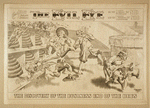"Did you have to give up all your jewels when you were divorced?"
"Divorced---?" Susy threw her head back against the pillows and laughed. "Why, what are you thinking of? Don't you remember that I wasn't even married the last time you saw me?"
"Yes; I do. But that was two years ago." The little girl wound her arms about Susy's neck and leaned against her caressingly. "Are you going to be soon, then? I'll promise not to tell if you don't want me to."
"Going to be divorced? Of course not! What in the world made you think so?"
"Because you look so awfully happy," said Clarissa Vanderlyn simply.
---Edith Wharton, The Glimpses of the Moon (1922)
Wharton's novel about the possibility of love in a culture of divorce. Here, a child who has been abandoned (for all practical purposes) by her mother, mistakes newlywed bliss for the exuberant freedom of the soon-to-be divorcee.
"Divorced---?" Susy threw her head back against the pillows and laughed. "Why, what are you thinking of? Don't you remember that I wasn't even married the last time you saw me?"
"Yes; I do. But that was two years ago." The little girl wound her arms about Susy's neck and leaned against her caressingly. "Are you going to be soon, then? I'll promise not to tell if you don't want me to."
"Going to be divorced? Of course not! What in the world made you think so?"
"Because you look so awfully happy," said Clarissa Vanderlyn simply.
---Edith Wharton, The Glimpses of the Moon (1922)
Wharton's novel about the possibility of love in a culture of divorce. Here, a child who has been abandoned (for all practical purposes) by her mother, mistakes newlywed bliss for the exuberant freedom of the soon-to-be divorcee.





